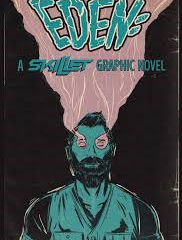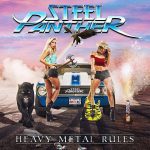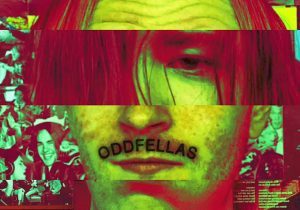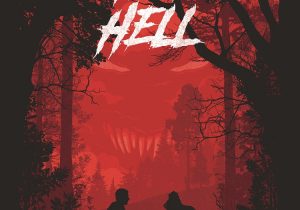
Jason Hartless - Photo by Chris Franchi
Wise beyond his years, JASON HARTLESS is a hard working music industry professional that has been professionally performing since the tender age of 5. Yes. That’s right. You read it: 5. Yes – 5. You’d better up your parenting skills there Sharon. Lil Bobby Jr. is going nowhere fast with your condescending attitude in regards to metal music.
An old soul at 23, Jason has played with more legendary bands than Sharon ever made out to in the back seat of her father’s Pinto. He recorded his first album with Corky Laing (Mountain), Richie Scarlet (Ace Frehley) and Jim McCarty (Cactus, The Rockets, Mitch Ryder & The Detroit Wheels). And is the touring/session drummer for legendary artists such as Joe Lynn Turner, Mitch Ryder, and the Nuge himself, Ted Nugent.
He is a modern renaissance man: an artist, a teacher, a student, a businessman…Jason Hartless is a unique bundle of energy looking for places to put his pedal to the metal and let loose a barrage of talent greater than most people could ever handle. (Especially that uptight Sharon)
Read on as we pick the mind of this modern-day man for all seasons: Jason Hartless…
You’ve been described as being a young guy with an old soul. Do you do anything not music?
It’s music all the time. Everything from playing in studio, and I also run two record labels and a publishing company. I’m always listening to music. I’m one of those guys that is always trying to discover something new by listening to different things. It’s funny. The only other thing I follow is hockey. I’m from Detroit so I’m a big Red Wings fan.
You sound like a diehard fan?
Yeah, I’m actually golfing at the moment with the Red Wings goalie.
You’ve worked with a lot more what one would call “classic” or “old school” rockers. This ties into your old soulness I suppose. Why is this your niche?
I’m very fortunate to have worked with some legendary musicians, whether it be in the studio or on tour. It’s a business, so you network, and you get gigs off other gigs. At the same time, the three main artists I’ve played with over my career, Ted Nugent being my main gig., but all playing with Joe Lynn Turner from Rainbow and Mitch Ryder from Mitch Ryder & The Detroit Wheels. You know, all three of those guys cover three separate decades.
Mitch Ryder was big in the 60s, and Ted was big in the 70s, and Rainbow was big with Joe in the 80s. SO – it’s kind of funny that I’ve done the classic rock thing, spanning multiple decades.
In comparison to your age, how do you connect with these artists?
Well, I’ve been called an old soul since I was three years old, because of my mature aspect. Growing up in this industry and working with a lot of people from a young age, it got me in the swing of things. I’ve never been nervous around anybody in this industry, whether I’m playing with them or just meeting them. It’s just something I’ve grown used to and grown up being around. It really helps. Yesterday I went to lunch with Ted, because we’ve been off the road for about a lunch. We were just talking music. We were talking about what we do. Ted’s 70 and I’m 23, but we still do the same thing. We work together on a daily basis. It’s connecting with these people on their level and talking about what we do for a living.
Do you feel this is going to silo you in any way? Do you feel that it’s going to hinder you from other experiences with other artists?
Absolutely not. I am one of those guys who never says no to anything.
You are like a Nicholas Cage! He says no to nothing!
Yeah right! Yeah, it’s funny because earlier in the year I was on tour with Joe Lynn Turner. When I’m home, I’m a studio musician at a studio in Detroit. I was on the road, and the last day with Joe, and the next day I had a session back home Detroit for a big band Christmas album. Going from one extreme to the next is what I love to do. I don’t try to label myself as a “rock drummer”. I’m a musician. Any sort of style or gigs, or opportunity that presents itself, I try to make sure that I can conform to the style and image the gig calls for.
Ted Nugent is a controversial figure. Tell me about what you’ve learned from touring with him and the experience you’ve gained from that.
What’s funny is that he’s 70 years old, and the dude is in the best shape I’ve ever seen for someone his age. Ted on stage is like James Brown on steroids. The guy goes up there and gives 150% in every single performance, regardless of whether we are in 160-degree weather (insanely hot) or a in a nice airconditioned theater. He just goes out there and puts every single bit into it. That’s what I learned from it: that age doesn’t matter, it’s what you give to your audience. Everybody is paying money to come see you play. Even though people aren’t coming to see Jason Hartless, they are coming to see Ted Nugent, it’s my job to make sure I’m putting in 110% and putting out even more energy than he’s putting out.
Who is in better shape, you or Ted?
I’m 23, so I’m built like a 23-year-old, but Ted’s in impeccable shape. He never sits down. He’s always working and doing something, especially when he is off the road. He has two giant ranches, one in Michigan and one in Texas. He is always doing work and trying to take care of his land and stock perfectly, exactly how it should be. He lives very much to nature. Everything he does is making sure that it follows what his property needs to do.
Have you gone bow hunting with Ted?
I haven’t, but we were talking yesterday about going hunting something in the fall here. I’ve never been hunting before. Actually, the first time I ever shot a gun was with Ted, the first day of rehearsal, three years ago.
That’s quite a way to kick-off a rehearsal!
Absolutely! When we found out that Randy and I had never shot a gun before, rehearsal stopped immediately. We went out to his range and shot some guns.
There you go! How are the crowds different for Ted Nugent? Are they different from other crowds?
It’s strange, because even though he is classic rock, and he was big in the late 70s, the demographic spans from 5 years old, all the way up to people in their 70s. He pulls from a lot of different demographics. He’s got the hunting fans, the music fans, political fans. It’s very much a melting pot mix of various demographics that show up.
Tell me a story that would be interesting to know about your interactions with Ted that you felt to be extremely meaningful.
Sitting and listening to stories of being in Detroit in the late 60s, because he is from Detroit as well. Playing places like the East Town Theater and the Grande Ballroom, all these iconic Detroit venues…hearing about playing with members of the Who, at a high school, in 1967. Listening to all these crazy lineup stories that happened back then are some of my most memorable memories with Ted.
Are you making memories with Ted as we speak?
Absolutely! Every time we perform is a different memory. I never get nervous, but occasionally I have to pinch myself because I know that I’m playing “Stranglehold” with the guy that wrote the song.
You host drum clinics. Tell me about your teaching technique. What draws you to this?
I always take the mentality of trying to make sure that you are finding your own sound, make sure you are listening to as much music as possible. I learned very differently. I learned how to play the drums by ear. I played professionally, not being classically trained. I didn’t get trained or how to read music until I was a teenager. I took private lessons to learn how to read music. I already knew how to play most of the beats and rhythms, so being able to go back and look at a piece of paper, and connect the dots, made it an easier experience. I’m of the mentality of “you should listen to as much music as possible” because you build a melting pot of different styles and sounds and influences. The biggest question I get asked is, “who is your favorite drummer?” My answer is, “Nobody.” I have 50 favorite drummers. If you only cater to one, you will only sound like that one. Being able to dig deep into multiple players, and feed from their styles and influences really builds your character and personality to your playing.
Do you have a style you prefer playing over the others?
Everything!
Everything! You love them all! When not touring or in recording sessions, you are also a music business management student at the Berklee? Tell me about that.
Yes! You know, since I was about 5-6 years old, it’s always been a dream of mine to go to Berklee’s College of Music. Now, to be able to be a student as such a prestigious college, it’s unbelievable. I always dreamt of one day to be able to add my name to the list of prestigious alumni that have gone there in the past. I’m about halfway through my bachelors. Once I’m done with that, I’m going on to my Masters in Music Business. Especially right now, that the music industry today is completely different than it was 5 years ago. I grew up in an industry that was thinking old school: you have to go out and tour to sell records. You have to get a radio campaign. Nowadays, yeah, touring is great, but how do I get my artist on a sportify playlist. It’s such a different ballgame, even in the last four or five years. Being ahead of the curve, and Berklee being the leader in the industry, really helps me to look into the future of what’s next in this business.
It sounds that you are learning things that are applicable to your work with Prudential Music Group. You are a managing partner there?
Yeah. It’s really great to, on top of study the music business, apply a lot of the things I do while I’m school. It’s great because many of my school assignments I use with projects in my company. Again, it really helps keep me in the times, because people will go to college, and by the time they get out, stuff that happened before they began is no longer the same. Being able to sustain the industry, and work in the industry, while I’m in school, really really helps.
How involved are you with the label?
I run about 90% of the day to day operations. I have two record labels, and a publishing company. Our one record label concentrates on new/emerging artists on top of a couple of catalogs. Our second record label is mainly a vinyl reissue label. We have partnered with Jack White and his beautiful pressing facility in Detroit, which opened about a year ago. Being able to keep everything in Detroit, and keeping it Detroit-made, also helps. I can drive 15 minutes from my house to go and check out the pressing of our product, and make sure that it’s running smoothly. The publishing company houses the catalog from both labels. We are a small company, but we are distributed through Sony Orchard. It’s a small company with major label distribution, which helps us tremendously.
Speaking of vinyl, do those hold value in comparison to digital?
Absolutely. Whats funny is that I look at vinyl more like art. The reason I’ve found that vinyl has gone up 19% in the first quarter this year was because people are realizing that they want the kinesthetic value in music that they are not getting from streaming and digital. Having a vinyl record, you are getting an art piece that you can physically hold and hang on your wall and listen to. Especially now with the craze of weird colored vinyl, that adds extra value to the art form that vinyl records really are. On top of that, they sound phenomenal.
How does a record label stay relevant with the ease of self-publishing?
It’s tough. It really is. We just try to stay ahead of the game. I’m not a fan of DIY artists. I feel that it takes a team of professionals to break an artist. What happens is that people are able to release music on their own, and the music industry becomes so over saturated with music that would not normally be released. You have so many people trying to get their name out there, but clearly, they do not have a real team behind them to get them to that point. It really makes the market over-saturated.
How do you draw the line from being a label and managing or promoting a band?
I am an artist myself, so I take the stance of “what is best for the artist?” Instead of giving the band 15-20% which is a very small portion, we give them 50% of whatever revenue they are going to get. It’s the artist that is making the art. We are the ones making the art viable in terms of putting it in front of consumers. Making sure that the artist is getting the fairest deal as possible is what I try to do.
Connect with Jason Hartless (click icons):
Tags: 2018, Ace Frehley, Artist, Berklee, Cactus, classic rock, College of Music, Deep Purple, Detroit, drum, drummer, Interview, Jason Hartless Corky Laing, Jim McCarty, Joe Lynn Turner, magazine, Mitch Ryder, Mitch Ryder & The Detroit Wheels, Mountain, music, Prudential Publishing, Prudential Records, Richie Scarlet, rock magazine, Rock Revolt, Rock Revolt Magazine, RockRevolt, RockRevolt Magazine, Rouge Records, Stranglehold, studio musician, the Nuge, The Rockets

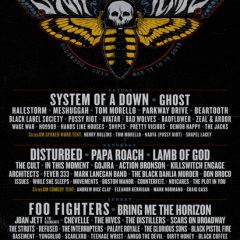


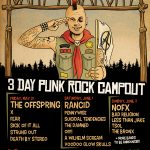

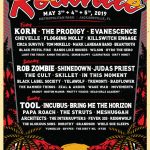

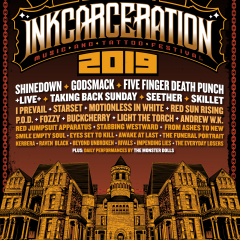








 Share On Facebook
Share On Facebook Tweet It
Tweet It














